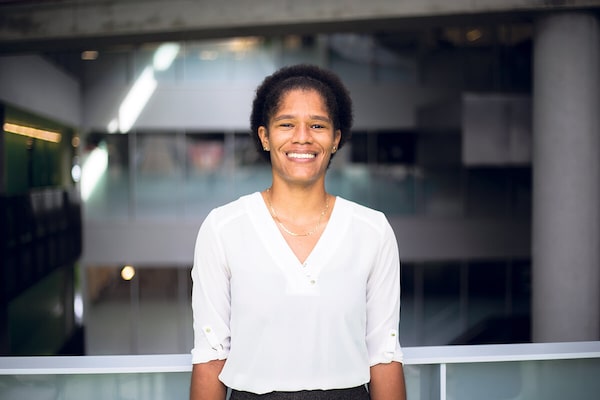
Éloise Edom is a Polytechnique graduate and research associate at the Institut de l’énergie Trottier.ÉMILIE FERGUSON
Canada’s energy systems are critical, highly complex and overdue for changes that will advance the country towards a zero-carbon economy. Éloïse Edom, an associate researcher at Polytechnique Montréal’s Institut de l’énergie Trottier – whose mission is to support the search for sustainable solutions towards a clean energy transition as well as to disseminate knowledge and contribute to the conversation on energy issues – has made it her life’s work to figure out how to make electricity grids cleaner, more resilient and sustainable.
“My work in the energy sector has always been from the perspective of decarbonizing our society by 2050,” says Ms. Edom, who graduated from Polytechnique Montréal with a bachelor’s degree in mechanical engineering, a professional master’s degree in energy engineering and a research master’s degree in applied mathematics. “I focus mainly on the subject of electrification: How do we electrify heating in buildings? How can we improve the electricity grid so we can rely more on it in the future?”
To advance these goals, Ms. Edom leads studies and analyses that are shared with governments, utilities and other decision-makers. A recent project, for example, looked at the pros and cons of developing hydrogen power in Quebec. Ms. Edom’s research underlined the high costs of such an undertaking but also concluded that it may still be a viable choice for certain remote locations where the current power source is gasoline.
Another project examined the obstacles to improving the power gid in Eastern Canada, from Ontario to the Atlantic provinces.
“We talked to people working in the field to try and find out what’s making it so difficult to produce and distribute more electricity,” recalls Ms. Edom. “We did several workshops and prepared a report to review the state of knowledge about this problem.”
In many cases, she says, the problem isn’t caused by technology – or lack of it – but rather the result of poor collaboration between provinces and organizations. Inadequate funding to put towards the grid is also a common issue.
Politics can sometimes play a role. In particular, a change in government has from time to time upended public policy on electricity systems and energy, says Ms. Edom.
“It’s a very long-term and complex challenge, and I’m like a grain of rice – but each grain can make a difference,” she says. “For me, it’s really important for society to have a long-term vision.”
Talking to media about the science and rationale behind decarbonization has been an important way to help shape this societal vision, adds Ms. Edom. She’s learned to explain complex concepts in a way that people can understand easily and relate to.
“But there’s still much work to be done – there’s a lot of awareness but not a lot of impactful actions,” she says. “There’s a lot of opportunity for organizations like ours to help Canada reach a net-zero target for 2050.”
Advertising feature produced by Randall Anthony Communications. The Globe’s editorial department was not involved.